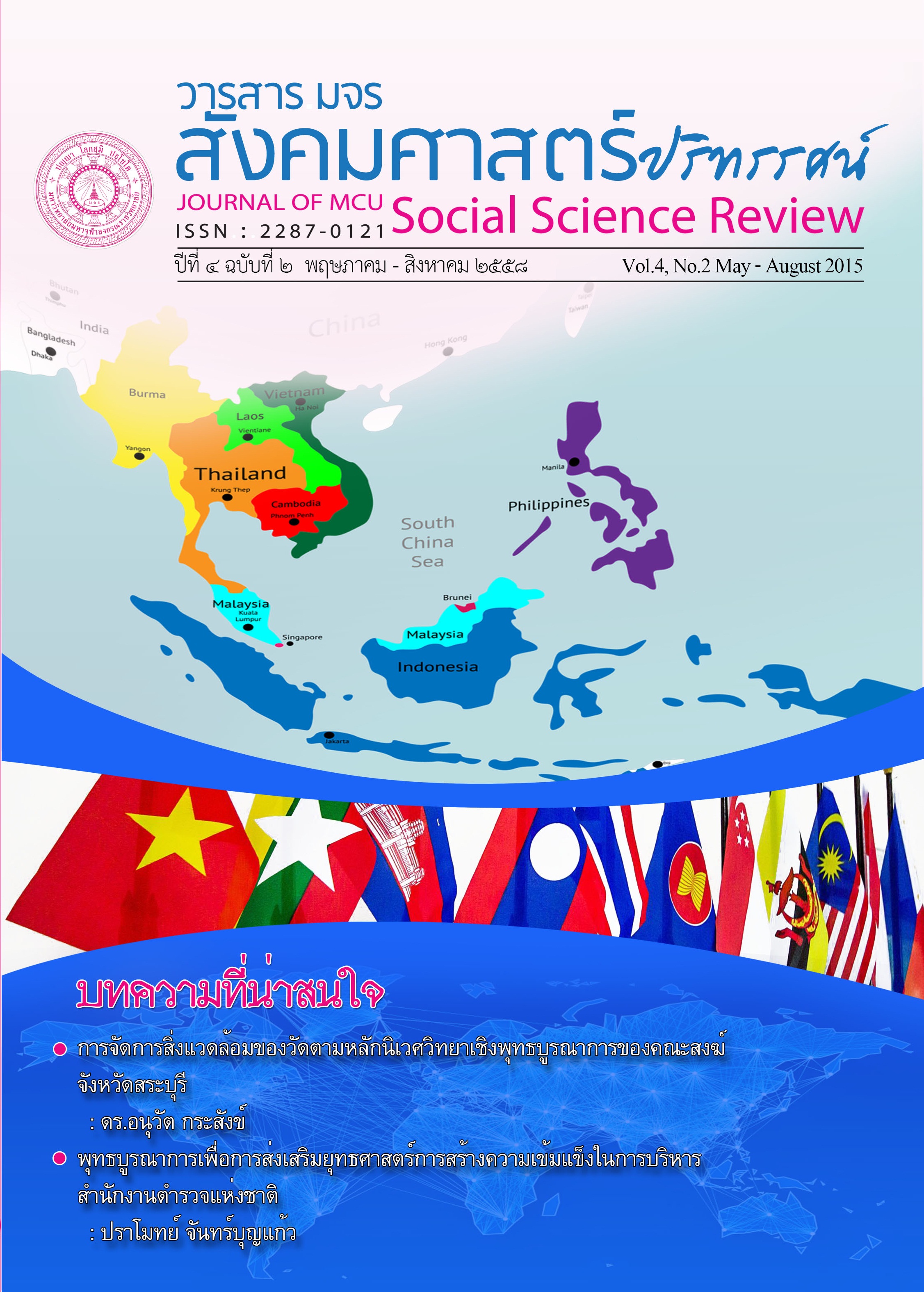พุทธบูรณาการเพื่อส่งเสริมยุทธศาสตร์การสร้างความเข้มแข็ง ในการบริหารของสํานักงานตํารวจแห่งชาติ
คำสำคัญ:
พุทธบูรณาการ, ยุทธศาสตร์การสร้างความเข้มแข็ง, การบริหาร, สำนักงานตำรวจแห่งชาติบทคัดย่อ
การวิจัยนี้มีรูปแบบการวิจัยเชิงคุณภาพด้วยการสัมภาษณ์เจาะลึกผู้เชี่ยวชาญจํานวน ๒๕ รูป/คน และการสนทนากลุ่มเฉพาะผู้ทรงคุณวุฒิ จํานวน ๑๒ รูปหรือคน วิเคราะห์ข้อมูลเนื้อหาแบบ หลัก SWOT Analysis โดยมีวัตถุประสงค์ ๓ ประการ ต) แนวคิด ทฤษฎียุทธศาสตร์การพัฒนา บุคลากรและหลักพุทธธรรมสําหรับการพัฒนาบุคลากรของสํานักงานตํารวจแห่งชาติ พบว่า ต้องมี การกําหนดเป้าหมาย (Target) ที่ชัดเจน การกําหนดแผนงานในการปฏิบัติงาน (Working) อย่าง เหมาะสม มีการเลือกใช้ทรัพยากร (Resource) ที่มีความพร้อม การกําหนดแผนการประเมินหรือ ตัวชี้วัดความสําเร็จ (Assessment) ที่เป็นไปได้ และผู้รับผิดชอบระดับองค์การและระดับหน่วยงานมี การกําหนดหน้าที่ (Function) และบทบาทในการส่งเสริมยุทธศาสตร์การสร้างความเข้มแข็งในการ บริหาร ส่วนหลักพุทธธรรมที่เหมาะสม พบว่า มีหลักหิริโอตตัปปะ หลักไตรสิกขา หลักอิทธิบาท ธรรม และหลักสติสัมปชัญญะ สําหรับสภาพทั่วไปของการพัฒนาบุคลากรของสํานักงานตํารวจ แห่งชาติ พบว่า อุปสรรคของการพัฒนาบุคลากรอยู่ที่ประชาชนยังไม่พอใจในการปฏิบัติหน้าที่ของ เจ้าหน้าที่ตํารวจ มีระบบอุปถัมภ์ และเจ้าหน้าที่ยังขาด ทักษะ ความชํานาญ ความรู้ ความสามารถ ด้านเทคโนโลยี และพุทธบูรณาการเพื่อส่งเสริมยุทธศาสตร์การสร้างความเข้มแข็งในการบริหารของ สํานักงานตํารวจแห่งชาติ พบว่า ๑. การบริหารโดยยึดหลักการบริหารกิจการบ้านเมืองที่ดีอยู่ที่การ มุ่งการปลูกฝังทัศนคติต่อการไม่ยอมรับผู้ที่มีพฤติกรรมชั่วร้าย การสร้างระบบการกําราบผู้ไม่เกรง กลัวความชั่ว ๒. ผู้มีส่วนเกี่ยวข้องและประชาชนผู้รับบริการมีความพึงพอใจต่อการบริหารงานของ สํานักงานตํารวจแห่งชาติ อยู่ที่การฝึกหัตตนเอง การพัฒนาทักษะการสื่อสารที่ ๓.กระบวนการ บริหารจัดการที่มีประสิทธิภาพ อยู่ที่การปลูกพลังอุดมการณ์ของตํารวจในเกิดความรักและความศรัทธาในอาชีพ และ ๔. ข้าราชการตํารวจมีสมรรถนะสูงในการปฏิบัติหน้าที่และนําระบบเทคโนโลยี มาใช้ในการบริหารจัดการ อยู่ที่บุคลากรมีความฉลาด มีสติ ตั้งอยู่ในความไม่ประมาท พลิกวิกฤติให้ เป็นโอกาสและรู้ทั้งตนเอง และฉลาดรู้เท่าทันโนเทคโนโลยีเพื่อใช้ในการบริการจัดการ
เอกสารอ้างอิง
(๑) วารสาระ พระพรหมคุณาภรณ์ (ป.อ. ปยุตโต), หัวใจพระพุทธศาสนา, วารสารพุทธจักร ปีที่ ๖๑ ฉบับที่ ๕พฤษภาคม ๒๕๕๐
(๒) วิทยานิพนธ์/รายงานวิจัย:
กัลยาณี คูณมี “การบริหารผลงานและการจัดสรรสิ่งจูงใจต่อการพัฒนาระบบราชการและข้าราชการไทย” รายงานการวิจัย. คณะพัฒนาทรัพยากรมนุษย์ : สถาบันบัณฑิตพัฒนบริหารศาสตร์, ๒๕๕๒
จิดาภา เร่งมีศรีสุข. “ยุทธศาสตร์การพัฒนาจริยธรรมาภิบาลขององค์กรปกครองส่วนท้องถิ่นในเขตภาคกลาง” วิทยานิพนธ์พุทธศาสตรดุษฎีบัณฑิต. บัณฑิตวิทยาลัย: มหาวิทยาลัยมหาจุฬาลงกรณราชวิทยาลัย, ๒๕๕๖.
จิรประภา อัครบวร และคณะ, “การศึกษาเพื่อวางระบบการพัฒนาข้าราชการแห่งอนาคต”รายงานการวิจัย, สถาบันพัฒนาข้าราชการพลเรือน สํานักงานคณะกรรมการข้าราชการพลเรือน (ก.พ.), ๒๕๕๒ ฌาน ตรรกวิจารณ์. “การพัฒนาทรัพยากรมนุษย์เชิงพุทธ”.วิทยานิพนธ์ปรัชญาดุษฎีบัณฑิตบัณฑิตวิทยาลัย : มหาวิทยาลัยรามคําแหง,๒๕๕๐.
ทวีศักดิ์ ทองทิพย์. “การวิเคราะห์การศึกษาตามหลักไตรสิกขา”.วิทยานิพนธ์พุทธศาสตรดุษฎีบัณฑิต. บัณฑิตวิทยาลัย: มหาวิทยาลัยมหาจุฬาลงกรณราชวิทยาลัย, ๒๕๕๕.
ปชาบดี แย้มสุนทร. “กลยุทธ์การส่งเสริมความผูกพันต่อองค์กรตามหลักสังคหวัตถุของแรงงานอุตสาหกรรมอิเล็กทรอนิคส์” วิทยานิพนธ์พุทธศาสตรดุษฎีบัณฑิต. บัณฑิตวิทยาลัย:มหาวิทยาลัยมหาจุฬาลงกรณราชวิทยาลัย, ๒๕๕๖
พระวิมาน คมภีรปญโญ (ตรีกมล), “การศึกษาวิเคราะห์ศีล ๕ ในฐานะเป็นรากฐานของสันติภาพ”วิทยานิพนธ์พุทธศาสตรดุษฎีบัณฑิต. บัณฑิตวิทยาลัย: มหาวิทยาลัยมหาจุฬาลงกรณราชวิทยาลัย, ๒๕๕๕.
สุปรียา ธีรศิรานนท์, “การศึกษาวิเคราะห์พัฒนาการการเรียนรู้ในกรอบของไตรสิกขา กับ ทฤษฎีการเรียนรู้ของสกินเนอร์” วิทยานิพนธ์พุทธศาสตรดุษฎีบัณฑิต. บัณฑิตวิทยาลัย:มหาวิทยาลัยมหาจุฬาลงกรณราชวิทยาลัย, ๒๕๕๖.
สุรินทร์ ศิธรกุล. “ผู้นําการบริหารกิจการบ้านเมืองที่ดีขององค์กรปกครองส่วนท้องถิ่นในเขตจังหวัดภาคเหนือตอนบน” วิทยานิพนธ์พุทธศาสตรดุษฎีบัณฑิต บัณฑิตวิทยาลัยมหาวิทยาลัยมหาจุฬาลงกรณราชวิทยาลัย, ๒๕๕๖.
อนุวัต กระสังข์, “การพัฒนาทรัพยากรมนุษย์ในองค์กรตามแนวพุทธภายใต้กระแสบริภาคนิยม”วิทยานิพนธ์พุทธศาสตรดุษฎีบัณฑิต. บัณฑิตวิทยาลัย: มหาวิทยาลัยมหาจุฬาลงกรณราชวิทยาลัย, ๒๕๕๖.
เอื้อมอร ชลวร. “การพัฒนาปัญญาในพระพุทธศาสนาเถรวาท”,วิทยานิพนธ์พุทธศาสตรดุษฎีบัณฑิต. บัณฑิตวิทยาลัย: มหาวิทยาลัยมหาจุฬาลงกรณราชวิทยาลัย, ๒๕๕๓
(๓) สื่ออิเล็กทรอนิกส์/เว็บไซต์:
สํานักงานคณะกรรมการพัฒนาการเศรษฐกิจและสังคมแห่งชาติ สํานักนายกรัฐมนตรี, แผนพัฒนาเศรษฐกิจและสังคมแห่งชาติฉบับที่ ๑๑ (พ.ศ.๒๕๕๖-๒๕๕๔). [ออนไลน์]. แหล่งที่มา: http://www.ldd.go.th/files/FilesFolders/Documents/bbd8512c-6c40-4776bcdc-734fa4f733d7_0.pdf. [๒๖ ตุลาคม ๒๕๕๖]
๒. ภาษาอังกฤษ
Becker, G.S. Human Capital : A Theoretical and Empirical Analysis with Special
Reference to Educationm. Chicago : The University of Chicago Press,1994
Nadler, Leonard. Designing Training Program. The critical events model. Reading,Mass. Addison - Wesley, 1982.
Pace. RW. Smith. Human Resource Development. New Jersey: Prentlice Hall,1991.
ดาวน์โหลด
เผยแพร่แล้ว
รูปแบบการอ้างอิง
ฉบับ
ประเภทบทความ
สัญญาอนุญาต
ลิขสิทธิ์ (c) 2018 วารสาร มจร สังคมศาสตร์ปริทรรศน์

อนุญาตภายใต้เงื่อนไข Creative Commons Attribution-NonCommercial-NoDerivatives 4.0 International License.
เพื่อให้เป็นไปตามกฎหมายลิขสิทธิ์ ผู้นิพนธ์ทุกท่านต้องลงลายมือชื่อในแบบฟอร์มใบมอบลิขสิทธิ์บทความให้แก่วารสารฯ พร้อมกับบทความต้นฉบับที่ได้แก้ไขครั้งสุดท้าย นอกจากนี้ ผู้นิพนธ์ทุกท่านต้องยืนยันว่าบทความต้นฉบับที่ส่งมาตีพิมพ์นั้น ได้ส่งมาตีพิมพ์เฉพาะในวารสาร มจร สังคมศาสตร์ปริทรรศน์ เพียงแห่งเดียวเท่านั้น หากมีการใช้ภาพหรือตารางหรือเนื้อหาอื่นๆ ของผู้นิพนธ์อื่นที่ปรากฏในสิ่งตีพิมพ์อื่นมาแล้ว ผู้นิพนธ์ต้องขออนุญาตเจ้าของลิขสิทธิ์ก่อน พร้อมทั้งแสดงหนังสือที่ได้รับการยินยอมต่อบรรณาธิการ ก่อนที่บทความจะได้รับการตีพิมพ์ หากไม่เป็นไปตามข้อกำหนดเบื้องต้น ทางวารสารจะถอดบทความของท่านออกโดยไม่มีข้อยกเว้นใดๆ ทั้งสิ้น





